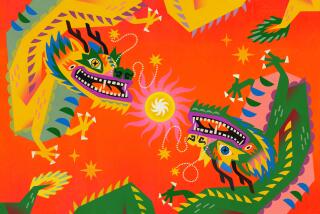CHINESE-AMERICANS REACT TO ‘THE DRAGON’
- Share via
Despite a tentative agreement by MGM/UA to add a disclaimer to “Year of the Dragon” last week, there still was harsh reaction toward the movie in the Asian American communities here, in New York and in San Francisco.
The film’s portrayal of Chinese-Americans and women, with its frequent violence, has caused picket lines to form in Hollywood, New York, San Francisco, Washington and Boston.
In the film, a police captain (Mickey Rourke) sets out to eradicate crime in New York’s Chinatown. In the process, he clashes with the leader of a Chinese crime syndicate (John Lone) and has an affair with a Chinese woman who is a TV reporter (Ariane).
Calendar surveyed the communities and found virtually no favorable comments:
SAN FRANCISCO
Herb Chew, member of the Bay Area Coalition against “ Year of the Dragon “: “It’ll win an Academy Award if they have a category for Most Racist, Most Bigoted and Most Offensive. There were too many stereotypes that were played out. The film made it appear that if you were a youth in Chinatown, you were in a gang or if you were an adult, you were (in) a Tong. I think what they (the film makers) tried to do is show that there is a gang problem in Chinatown. And there is. But they make it appear like everyone in Chinatown is affected by gangs.”
Jim Yee, Executive Director, National Asian American Telecommunications Assn. : “Cinematically, it (the film) is very strong. It has a definite air of credibility to it and that’s what makes it dangerous. The film is full of contrasts between Anglos and Asians. For example, the character of Stanley White’s wife is seen as full of life, independent, and constantly differing with him (White). Whereas Tracy Tzu may be verbally articulate and strong, but she submits quite readily to him (White). She argues with him one minute and the next minute, she’s nude in bed with him.”
Kayo Hatta, writer for East Wind magazine : “People in the Midwest know very little about the Asian community. They’re going to take this movie to be representative of what Asian people are like, which as depicted in the film is very subhuman. In a situation like the Vincent Chin case (in which an Asian American was attacked and beaten to death for no apparent reason), there is very little public outcry because as far as people know, Asian people deserve what they get. After all, look at them. They’re immersed in gang violence and crime!”
Janice Sakamoto, program coordinator, National Asian American Telecommunications Assn. : “I was extremely offended by the way Asian American women were portrayed. In one scene, the Asian American reporter is practically raped by the Caucasian cop. Then there’s another scene where she tells him she loves him and his response was, ‘Chinks can’t love.’ He’s portrayed as an obvious racist, yet the film condones his attitude and action.”
Robin Wu, civil rights program developer, Chinese for Affirmative Action : “I think the danger of this film is its broader implications during a time when films about vigilantes like Rambo are very popular. Like Rambo, this film is trying to win the war we lost in Vietnam, except this white cop is trying to win the war in Chinatown. This kind of coincides with other activities around the country. There’s a trend towards the right with people becoming more conservative and less tolerant with people who are not themselves. This film adds to that sentiment.”
More to Read
Only good movies
Get the Indie Focus newsletter, Mark Olsen's weekly guide to the world of cinema.
You may occasionally receive promotional content from the Los Angeles Times.







